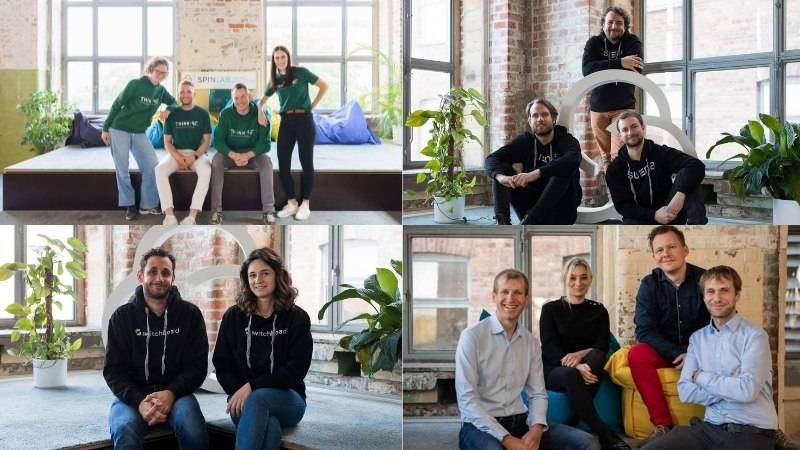Never before has so much venture capital flowed into startups as in the past year. 2021 was a record year with mega deals and new unicorns. For the first time ever, European startups raised over $100 billion. This represented a 115% increase in the funding amount from 2020. Currently, VC funding receives the most attention in the media. For young startups, it seems to be the best way of funding. However, there are more alternatives to the classic VC money. As part of the 13th edition of the HHL SpinLab Investors Day, Damian Polok (Silicon Valley Bank), Isabella Hermann-Schön (Round2 Capital), Paul Becker (re:cap) and Patrick Walsh (uncapped) came together in Leipzig to discuss venture capital alternatives. This panel dives into the questions whether the alternatives are in conflict with the VC world, what factors to be aware of when it comes to financing and how the diffrent options work.
Brace yourself! VC winter is coming
Dealroom shared interesting data in the “State of VC in 2022” on the slow-down in venture capital activity in Q2, 2022, particularly in the growth stage. As late-stage investors pull back on investing, valuations will most likely come down and the pace of investing will continue to slow. Investors put 23 percent less funding into startups in the second quarter, following a 20 percent drop in the first quarter. Paul Becker, CEO of re:cap believes that the slowdown of VC funding will lead to additional demands for other finance options. “It’s natural that many founders now have the feeling that they need to look elsewhere in order to grow.”
Revenue-based financing (RBF)
The truth is that VC funding is not accessible for everyone. Most startups fail before raising, some have to find other ways to grow. Venture Capital has been the go-to option for most startups, but they aren’t necessarily best-suited for founders that want to avoid making personal guarantees or giving away equity. This is where revenue-based financing comes in. In the European ecosystem, revenue-based financing is currently emerging.
/HHL%20SpinLab%20Investors%20Day%20VC%20Alternatives%20Patrick%20Walsch.jpg?width=741&name=HHL%20SpinLab%20Investors%20Day%20VC%20Alternatives%20Patrick%20Walsch.jpg) Patrick Walsh, Head of German Sales at Uncapped explained in the panel that the choice of funding depends on the timing.
Patrick Walsh, Head of German Sales at Uncapped explained in the panel that the choice of funding depends on the timing.
Patrick Walsh on RBF: “We at Uncapped provide business advances of between £10k and £10m with 0% interest and no hidden charges, allowing founders to access fair and flexible finance. It makes money by charging a low flat fee which is paid back from future sales revenue.” He further explained that RBF is a suitable instrument for founders that don’t want to sell their company or for businesses that have no exit potential. This is a target group that is not a match for VCs at all.
This revenue share runs until a maximum repayment amount agreed in advance is reached. In other words, the company receives an investment and in return gives up a small portion of its monthly sales for a certain period of time instead of shares. The amount of the ongoing repayments is therefore flexible and depends on the sales performance of the company. The simplicity, flexibility and non-dilutive nature of revenue-based financing is a game changer for funding growth companies with recurring revenues. But what must be taken into account is that RBF is typically limited to certain business models, especially in E-Commerce, SaaS and FinTech.
Venture Debt
Venture debt has been very common, especially in the U.S. and Israel, while in Germany it arrived first in 2018, when Silicon Valley Bank, established a branch in Europe. It was the first bank to create loan products for startups. Meanwhile, there are more providers on the German and European market. In addition to the panel, Heinrich Arnold (Davidson & W Technology Growth Fund - the very first venture debt provider in Germany) gave an exciting keynote during the HHL SpinLab Investors day about his experiences and learnings in venture debt. As a venture debt pioneer in Germany, Davidson Capital & W Growth Technology launched its second Growth Credit Fund at the end of 2021 with a total volume of 150 million euros. Arnold Heinrich said that venture debt is still quite new in Germany and many founders are not yet familiar with this type of financing.
Venture debt is basically quite similar to a bank loan. A company receives a defined amount of money and pays it back to the investor after a certain period of time at a previously agreed fixed interest rate. When venture debt is raised, no ordinary shares or company shares usually have to be issued in exchange for capital. This means that founders are more independent in their decisions. For venture debt, the interest rates are much higher than for a bank loan because the companies are not yet profitable and therefore the risk of default is much higher.
Damian Polok, Senior Vice President of Silicon Valley Bank highlighted during the panel, that companies at the very beginning generally do not qualify for venture debt. Venture debt is a loan designed for fast-growing investor-backed startups. It most is often secured at the same time or soon after an equity round and is typically used to extend runway to the next round.
Going hand in hand
re:cap founder Paul Becker shared in the panel that he often gets whether the alternative financing options want to destroy venture capital. His answer to this is: "No! That is not what we are looking for. We are venture capital backed up by ourselves. We believe that there are good cases for raising venture capital, but it’s not the best use case instrument for everyone. Whether for bridging, supplementing or as an alternative: With venture debt or RBF, startups receive financing that can be used in a self-determined manner.” A few months ago, it was announced that Silicon Valley Bank will provide $100 million credit facility to Berlin-based platform re:cap. Also, Uncapped raised an $80 million combined funding round of debt and equity to launch a suite of banking services tailored to the needs of this new wave of tech-driven companies. The round was led by Lakestar.
/HHL%20SpinLab%20Investors%20Day%20VC%20Alternatives%20Isabella%20Hermann-Sch%C3%B6n.jpg?width=685&name=HHL%20SpinLab%20Investors%20Day%20VC%20Alternatives%20Isabella%20Hermann-Sch%C3%B6n.jpg) Isabella Hermann-Schön thinks it's essential for founders to look into all financing options.
Isabella Hermann-Schön thinks it's essential for founders to look into all financing options.
Isabella Hermann-Schön, Managing Partner of Round2 Capital Partners, emphasized that the market is large enough for venture capital, revenue-based financing and venture debt. It just depends on where the company wants to go. All participants in the discussion agreed that the finance alternatives create more synergy than competition. “Are we in conflict or cooperating with the VC world? It’s a question of timing. Sometimes the relationship with VC is symbiotic, sometimes competitive, a mix solution, and often it’s an alternative,” elaborates Patrick Walsch.
The financing landscape for startups is much more diverse than it seems
![]()
Startups have more funding options than ever. Therefore, you should do some research into the different types available. Isabella Hermann-Schön underlined: "It is important that companies at a very early stage should be aware of all potential financing options. Then it depends on the vision that the founders have and where they want to head with their company."
This will help you choose the source of funding that works best with your situation and company stage. A final take-away is that an entrepreneur always has an alternative financing source. It’s a matter of picking the right type that work for each business case. Never before have the options for financing been as varied as they are now. To conclude, Paul Becker stated: "We all share the goal of enabling startups to get the best possible financing solution and to foster entrepreneurship."
➡️Your startup needs funding support? Then check out our startup accelerator program. We at SpinLab have a large investor network and experienced coaches as well as mentors to support you through your journey.







/RootCamp_Logo-Ecosystem.png?width=200&name=RootCamp_Logo-Ecosystem.png)
/Bitroad_Logo-Ecosystem.png?width=200&name=Bitroad_Logo-Ecosystem.png)



/White%20Versions/stadt_leipzig_white.png?width=130&name=stadt_leipzig_white.png)
/lfca_white.png?width=119&name=lfca_white.png)
/bmwi-white-engl-2022.png?width=573&name=bmwi-white-engl-2022.png)
/White%20Versions/sachsen_signet_white.png?width=90&height=362&name=sachsen_signet_white.png)